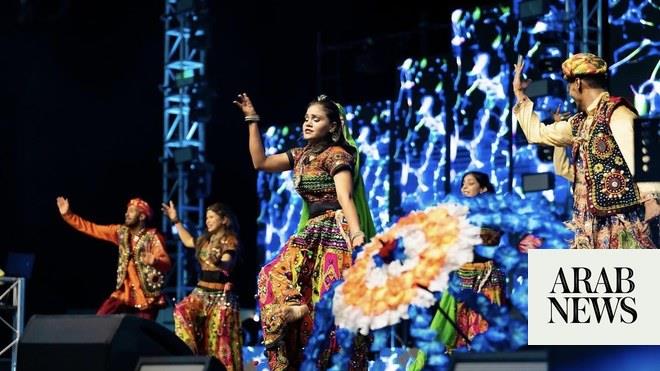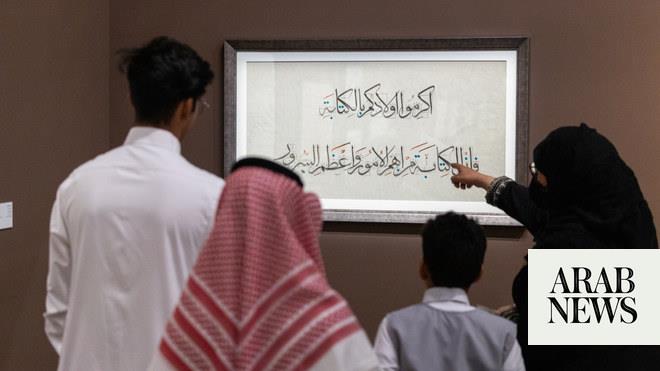
Some 246 athletes from 22 Arab countries all going for gold in Buenos Aires
Raucous festival marked the curtain-raising of the Games
BUENOS AIRES: Argentina’s famous Obelisco de Buenos Aires, much like it has for the past 82 years, stood erect in the center of the capital last night. Only on this cool spring evening, instead of being the focal point of anti-Peron protesters or World Cup-winning celebrants, it was lit up in a catalogue of color and enveloped in a cacophony of music to salute sport, gender equality, inclusion, and the South American country’s famous Latin spirit.
The raucous festival marked not only the curtain-raising of the third iteration of the quadrennial Youth Olympic Games, but also the first time any major opening ceremony has eschewed a traditional stadium or arena. Instead, in keeping with the Games’ theme of sport for all, the event was open to the public, attracting — organizers estimated — close to half a million spectators.
Among those basking in the moment were 4,000 athletes between the ages of 15 and 18 and representing 206 countries, including, for the first time, Kosovo and South Sudan. Another Olympic-first is that the two-week Games will feature equal numbers of male and female participants. This equality was reflected last night, when a man and a woman lit the Olympic cauldron together.
Females remain underrepresented when it comes to athletes from the Arab World. The 22 Arab League nations have brought 246 athletes to Argentina, with 98 girls and 148 boys. Only Comoros, Lebanon and Tunisia have more female participants than male, with Kuwait, Libya and Qatar not bringing a single female athlete.
“This Youth Olympic gathering is an important platform for our participants to pick up and hone their experiences and prepare for future events — they are the core of our future athletes,” said Talal Al-Shinqeeti, acting secretary-general of the National Olympic Committee of the UAE, who have brought four females and four males to Argentina.
“Our main objective is to
represent the nation in style. Moreover, the gathering of 4,000 athletes in a competitive atmosphere will further friendship and fraternity and give a true meaning of challenge and fair play.”
Saudi Arabia have brought nine youths to compete across six sports. Raghad Bu Arish, the Kingdom’s sole female athlete, will contest the women’s 100-meters, while three other male athletes will also compete in the athletics.
Ahmed Al-Marwani, who will race in the 100-meters, and Mohammed Al-Muawi, competing in the 400-meters, have been preparing in the US. Fayez Al-Subaie, meanwhile, has been training for his 3,000-meter race in the high-altitudes of Ta’if in Makkah for the past two months. Coach Saad Al-Asmari, a former 3,000-meter Asian champion, believes all three are capable of placing among the medals.
Saudi Arabia will also participate in karate, swimming, taekwondo, weightlifting, and, most pressingly, fencing, which starts today. Fifteen-year-old Ali Saeed Al-Bahrani will begin his quest for a medal in the men’s Sabre Individual this morning inside the Africa Pavilion. And with the event being wrapped up in a single day, he could be one of the first medallists at this month’s games.
While Al-Bahrani was selected by his National Olympic Committee as part of the quota system, weightlifter Ali Yousef Al-Othman earned his place in Buenos Aires after qualifying with a third-place finish at the Asian Championships in April. He will contest the Men’s 85kg on Friday. It was a similar story for karateka Mohammed Al-Assiri, who successfully negotiated a qualification event in Croatia this summer, to compete in the men’s Kumite-61kg.
Karate is one of four new sports debuting on the Olympic stage. Sport climbing, dance sport and roller sports will also join the 28 other sports that featured at the previous edition of the Youth Olympics in Nanjing, China, four years ago. The new sports, complemented by new events and competition formats — including BMX freestyle, kiteboarding, futsal and beach handball — highlight one of the Youth Olympics’ secondary roles: As an experimental event for the Olympics proper.
The future of sport was just one of several topics explored at the International Olympic Committee’s first “Olympism in Action Forum,” which took place over the past two days. With speakers including IOC President Thomas Bach, former UN Secretary-general Ban Ki-Moon, and Syrian refugee-turned-Olympic swimmer Yusra Mardini, other topics included Women in Sport, Combatting Doping, Social Inclusion, and Generating Social Change Through Sport.
“The Olympism in Action Forum is one of the results of Olympic Agenda 2020, where we said we want to open our windows and doors,” Bach said. “We want to listen to society and to understand how the world sees us, rather than us telling the world how they should see us.”
For those on the streets of Buenos Aires last night, the first impressions of this first Youth Olympics outside of Asia have been highly positive. The next 12 days of sporting action, it is hoped, will only strengthen that.










